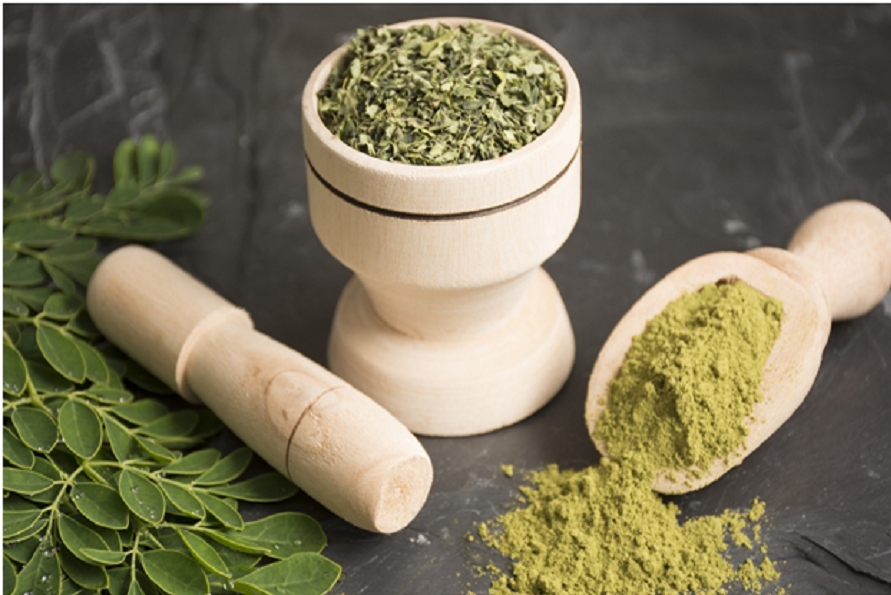The Moringa tree, known in Ayurvedic medicine as the “Tree of Life,” is a vibrant plant from the cabbage family. It is native to India and Sri Lanka, where it has been cultivated for more than two thousand years. Ayurvedic medicine uses this plant’s leaves to treat various ailments, such as diabetes, arthritis, skin problems, gastrointestinal disorders, and more.
Moringa leaves are rich in vitamins A and C and iron and calcium. They also contain many antioxidants that help reduce inflammation throughout the body. The leaves can be harvested anytime during the year, but the peak season is between July and September when they are at their most nutritious level and have reached maximum flavor levels.
They taste like spinach but have an earthier flavor with a hint of nuttiness that makes them highly versatile in cooking applications such as soups, salads, or even smoothies! Their mild flavor makes them easy to blend into other ingredients without overpowering them, so they’re great for adding to your favorite recipes or experimenting on your own!
Moringa leaves are an excellent source of protein, making them great additions to vegan dishes when combined with other ingredients.
How to Use Moringa
Moringa is a plant that’s been around for thousands of years. It’s also one of the most nutrient-dense things you can eat, so it’s no wonder it’s become so popular in recent years.
One of the best ways to consume moringa is by juicing it or blending it into smoothies. You can also add moringa leaves to salads or soups. You can even use moringa powder as an ingredient in baking and cooking!
But if you’re looking to maximize your intake, consider adding moringa to some of your favorite foods:
- Add a teaspoonful of moringa powder to your morning coffee or tea. It adds a subtle flavor that won’t overpower your drink but will give you a boost of antioxidants and vitamins!
- Mix a tablespoon of moringa seeds and honey into yogurt for a tasty snack that will keep hunger at bay for hours.
- Mix two teaspoons of seeds and honey into peanut butter for an energizing treat that will keep you going all day long!
Benefits of Moringa
1. Controls Cholesterol
Cholesterol is a waxy substance found in the blood, and it’s essential for many functions in your body. For example, it helps form cell membranes and aids in producing hormones. But too much cholesterol can lead to health problems. High levels of cholesterol can increase your risk for heart disease and stroke.
Fortunately, there’s a natural way to lower cholesterol levels. Moringa is a nutrient-dense food that offers numerous health benefits. In addition to vitamins A and C, iron, calcium, magnesium, and potassium, this ingredient is an essential nutrient for lowering blood pressure and reducing inflammation. The leaves also contain antioxidants called quercetin and kaempferol, which have been shown to help prevent cancer cells from growing and spreading.
2. Maintains Blood Sugar Level
Blood sugar levels are a severe concern for many people who struggle with diabetes and pre-diabetes. If you have high blood sugar, it is possible to control it with many things, such as diet, exercise, medication, and natural remedies. Moringa may be one of them.
Moringa is believed to help regulate blood sugar levels because of its high concentration of specific phytonutrients (plant nutrients) called “catechins.” Catechins have been shown to improve glucose tolerance in humans and animals. In addition to having anti-inflammatory properties that help fight diabetes-related inflammation, moringa leaves also contain iron and calcium. These two essential nutrients help balance blood sugar levels by supplying energy and helping with the absorption of glucose into cells.
Moringa leaves contain less than 2{a314a8426bec285f21a4042e6c7cf8c126af5bae26ed5b342ace92825a8aabd3} carbohydrate content (sugars), so they won’t spike your blood sugar when eaten alone or mixed into other foods like salads or smoothies.
3. Good for Bone Density
The nutrients found in moringa can help support your bones by promoting calcium absorption and reducing inflammation. It also contains magnesium, which is essential for your body to absorb calcium and carry it through your bloodstream where it’s needed most.
A compound found in moringa supports bone health by strengthening blood vessels and regulating blood flow throughout the body. It helps prevent bone loss caused by brittle blood vessels that don’t allow enough oxygen into some tissue regions when they’re damaged by disease or injury (such as fractures).
Moringa contains high amounts of vitamin C, essential for collagen production. Collagen is what gives our bones their strength and helps them repair themselves when they’re damaged or broken. As we age, our bodies produce less collagen than they used to, which means we have less ability to repair ourselves after injury or stress causes damage to our bones. By eating moringa regularly, you can help increase your body’s collagen production and improve the overall health of your bones!
4. Keeps weight in check
Moringa contains vitamins and minerals essential to a healthy diet, and it helps you feel full while keeping your energy levels high. People who drink moringa tea or use moringa powder as part of their weight loss plan tend to lose weight faster than those who don’t.
Moringa also contains antioxidants that boost metabolism and help reduce inflammation in the body. This may make it easier to lose weight because inflammation slows down our metabolism, so any way we can reduce it will help us burn more calories throughout the day.
The best thing about moringa for weight loss is that it doesn’t cause any side effects like other supplements may do—there have been no known side effects reported from taking moringa root powder or drinking tea made from this plant’s leaves!
5. Improves Brain Health
It helps prevent inflammation in the brain and other parts of the body. This can help prevent diseases like Alzheimer’s and Parkinson’s, and other neurological disorders. Moringa helps improve circulation, which can help keep your brain healthy by getting more oxygen and nutrients where they need to go.
It also contains vitamins that are essential for brain health, including vitamin B6 (pyridoxine), vitamin C (ascorbic acid), vitamin E (tocopherols), and folate (folic acid).
The high concentration of antioxidants in moringa can help prevent free radicals from damaging brain cells or causing cell death, leading to dementia or other mental disorders like Alzheimer’s disease (AD).
Moringa also contains amino acids that are important for neurotransmitter production (like serotonin) in the brain; these neurotransmitters help send signals between neurons to communicate effectively with each other.
6. Good for Hormonal Imbalance
Moringa is a natural remedy that can help you balance your hormones and restore your body’s natural rhythm. Moringa is rich in vitamins, minerals, and antioxidants that help boost your immune system and keep you healthy. It’s also rich in amino acids, essential for hormone production.
Moringa is a natural remedy that helps balance hormones naturally. It contains phytoestrogens that mimic estrogen levels in the body and helps to regulate them when they go out of whack. It also contains phyto progestin—a hormone that balances out the estrogen levels in your body. Moringa also contains magnesium and calcium—two minerals that are important for proper hormone function.
7. Helps in Digestion
Moringa contains many nutrients essential for proper digestion, including calcium, magnesium and potassium. It also contains vitamins A, B12 and C, which help with nutrient absorption. These nutrients help support the production of bile acids which aid in digestion by breaking down fat molecules into smaller particles to be absorbed into the bloodstream more quickly.
Moringa seeds are rich in protein, which helps boost digestive enzymes in the stomach and intestines. Moringa leaves have a high concentration of chlorophyll, which contains magnesium and silica—two essential minerals needed by the body to produce hydrochloric acid and mucous that help break down food particles into smaller pieces so they can be absorbed more easily.
Moringa also contains magnesium and calcium, which help regulate bowel movements by relaxing muscles in the bowels and intestines and reducing inflammation throughout the digestive tract.
Overall, the medicinal benefits of moringa are numerous. It’s an antioxidant, anti-inflammatory, anti-tumor, and anti-bacterial, and its shown promise in preventing oxidative stress-based conditions such as heart diseases (myocardial infarction – heart attack), hypertension (high blood pressure), cirrhosis of the liver (liver disease) and cancer.





